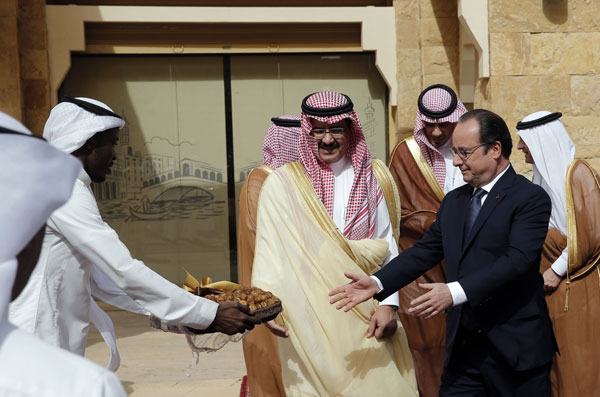Hollande attends Gulf meeting
Arab monarchs invite French president as demonstration of their faith in ally
Gulf monarchs gathered on Tuesday for an extraordinary summit, in the presence of French President Francois Hollande, as international concern grows over the war in Yemen.
The six Sunni-dominated Gulf Cooperation Council states met in the Saudi capital with their region also threatened by jihadists, and amid concerns over a potential final nuclear deal with Iran.
His presence as "guest of honor" at the Gulf summit comes just over a week before the GCC heads of state travel to their traditional ally Washington for talks.
President Barack Obama called that meeting to brainstorm on reducing regional conflicts and in a bid to allay Gulf fears over any US rapprochement with Iran.
Gulf leaders wanted Hollande to visit them ahead of the Washington summit to demonstrate that they have a faithful ally in France, "and they ask the same thing from Obama", a senior French official said.
Both Paris and Washington have sought to reassure the Gulf countries about an international accord being finalized over Iran's nuclear program.
"France and Saudi Arabia confirmed the necessity to reach a robust, lasting, verifiable, undisputed and binding deal with Iran," Hollande and Saudi Arabia's King Salman said in a statement.
The Gulf is worried that Shiite Iran might still be able to develop an atomic bomb under the deal that would limit its nuclear capabilities in return for a lifting of crippling international sanctions.
Teheran denies any attempt to develop a nuclear weapon.
Before Hollande, the only other foreign leader invited to a summit of the 34-year-old GCC was Iran's then-president Mahmoud Ahmadinejad, in 2007.
A day after the Gulf summit, US Secretary of State John Kerry is to visit Saudi Arabia before continuing to France for talks on regional security, a White House spokeswoman said on Monday.
The Riyadh summit brings together leaders from Bahrain, Kuwait, Oman, Qatar, Saudi Arabia and the United Arab Emirates.
All but Oman are members of the Saudi-led coalition that launched airstrikes in Yemen in late March against Iran-backed Houthi Shiite rebels and their allies who seized control of large parts of the country including the capital Sanaa.
King Salman also announced on Tuesday the establishment of a center to coordinate humanitarian assistance for Yemen, and invited the United Nations to join in relief work for the Arab country.
Yemeni President Abd-Rabbu Mansour Hadi fled a rebel advance on Aden, and is now in Riyadh. Anti-government forces have refused to concede territory or lay down arms despite international pressure.
International concern has grown over the war and its daily airstrikes.
The United Nations says at least 1,200 people have been killed since March 19, and has repeatedly warned that already impoverished Yemen faces a major humanitarian crisis.
The Saudi-led coalition should stop targeting Yemen's Sanaa airport, the United Nations said on Monday, as it prepared a plan to set up an air-bridge to bring humanitarian workers into the country from Djibouti and deliver aid around Yemen.
On Monday, the Saudi foreign minister said the Arab alliance conducting airstrikes against Houthi rebels in Yemen was considering calling truces in specific areas to allow humanitarian supplies to reach the country.
AFP - Reuters
|
French President Francois Hollande is offered a basket of dates by members of the Saudi delegation during a visit to the al-Diriyah historical site on the outskirts Riyadh on Tuesday. Christophe Ena / Pool Via AFP |



















